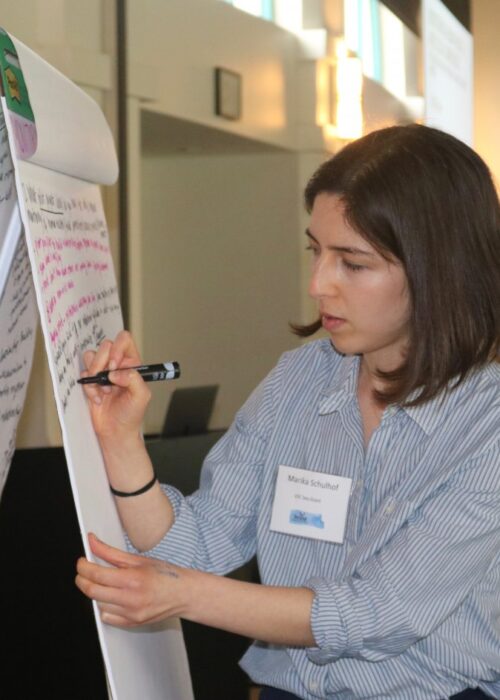USC Sea Grant’s Marika Schulhof Selected for AAAS Science & Technology Policy Fellowship
USC Sea Grant is proud to announce that former staff member, Marika Schulhof, was recently selected for the American Association for the Advancement of Science (AAAS) Science & Technology Policy Fellowship. Although we will miss Dr. Schulhof, we celebrate her award of this prestigious fellowship and greatly value her contribution to USC Sea Grant. Read below to learn about Marika’s time at USC Sea Grant, her new fellowship position, and how working for USC Sea Grant helped shape her advancing career path. Further, join us in celebrating Dr. Schulhof on this exciting new adventure!
Highlight on Marika Schulhof
 What was your role at USC Sea Grant?
What was your role at USC Sea Grant?
I was a Science, Research and Policy Specialist, which entailed bridging USC Sea Grant research with stakeholders and decision makers on a variety of environmental topics relating to urban coastal issues.
How long were you with USC Sea Grant?
Most recently, I was with USC Sea Grant for the last 2 years from 2018-2020 but also worked previously for 2 years as a Regional Planning Assistant in 2011-2013.
What are your most memorable experiences while at USC Sea Grant?
Over my years at Sea Grant, I really enjoyed having the opportunity to engage and work with a wide variety of stakeholders and decision makers – from scientists, to state natural resource agencies, nonprofits, education groups, and local governments – on a range of topics at the intersection of science and policy including sea level rise, oil spills, seaweed aquaculture, and harmful algal blooms. I also enjoyed meeting with and learning from Sea Grant experts across the nation and learning about the diversity of issues they encounter in their own regions. Having the opportunity to work on a breadth of topics spanning science and policy was incredibly exciting to me and ultimately set me on the path I’m on now!
What fellowship program did you get selected for? How many others were selected for this fellowship?
I am an executive branch fellow in the American Association for the Advancement of Science (AAAS) Science & Technology Policy Fellowship, serving at the U.S. Environmental Protection Agency. I’ll serve in this fellowship for up to two years in Washington D.C. The purpose of the fellowship is for scientists and engineers to learn about and contribute to federal policymaking and implementation through service in the executive, legislative or judicial branches of government, and to contribute scientific expertise to support evidence-based policymaking. This year, there are 162 incoming first-year fellows.
What will you be doing during your fellowship?
As a fellow in the Standards and Health Protection Division within the Office of Science and Technology in EPA’s Office of Water, I will be focused on policy issues related to the development and implementation of water quality standards to meet Clean Water Act requirements. For example, I’ll be working on topics such as wastewater treatment compliance challenges, helping states and tribes (and particularly small communities within them) to meet water quality standards. In addition, I look forward to learning about the various aspects of the water quality standards program and interacting with other programs within the EPA as well as state and regional offices.
What are you most excited about in this new position?
I’m very excited to work on the real-world applications of the research I carried out in graduate school, as an aquatic ecologist studying the impacts of nutrient pollution and other stressors on aquatic microbial communities. After completing my PhD and gaining experience in coastal policy issues at USC Sea Grant, it is really exciting to apply the science and policy knowledge I’ve gained thus far to water quality policy issues at the intersection of environmental and public health. I’m excited to learn about how science is translated into environmental regulations and how those regulations are implemented at the federal and state levels. I’m also eager to contribute to public service as a scientist.
How is COVID-19 affecting your transition?
Due to COVID-19, the fellowship is starting remotely, but I will be in Washington D.C. and hope that some form of normalcy resumes in the new year so that I can meet my colleagues and other fellows in person.
How do you think your time with USC Sea Grant has prepared you for the coming year?
My time at USC Sea Grant has prepared me to be nimble and adaptable, able to work on a broad range of issues at the intersection of science and policy. I enjoy engaging with the complexities that emerge at the intersection of human and natural systems, involving tradeoffs and decisions that must weigh environmental, economic, and societal costs and benefits.
What is a piece of advice for someone wanting to take your career path?
I would say explore your interests and passions, even if they don’t fall within clear disciplinary boundaries. It’s okay to be a big-picture thinker with interests across systems and topics. During my training as a scientist, I always had an interest in ecological topics beyond the lab that had broader relevance to society and policy. My role at USC Sea Grant allowed me to think about and work on environmental problems that span multiple disciplinary boundaries and sectors, and I’m excited to expand upon the foundation I gained at USC Sea Grant during my fellowship.